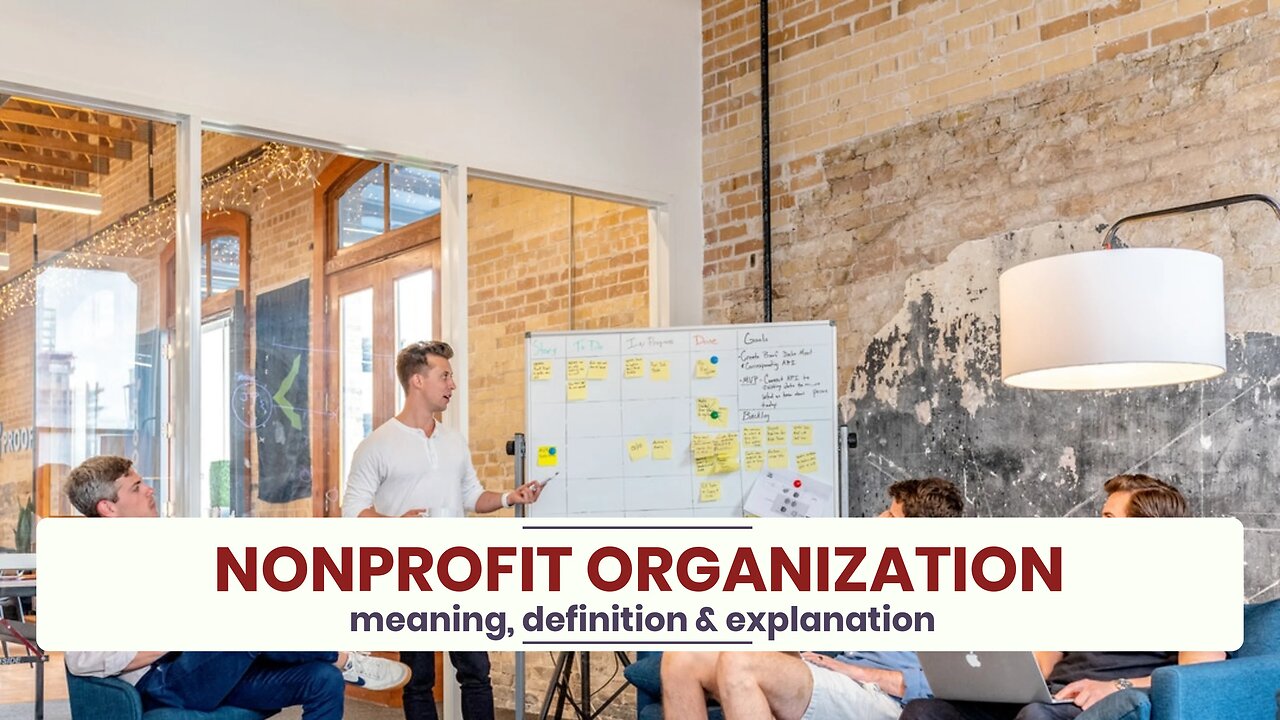Premium Only Content

What is NONPROFIT ORGANIZATION?
✪✪✪✪✪
http://www.theaudiopedia.com
✪✪✪✪✪
What does NONPROFIT ORGANIZATION mean? NONPROFIT ORGANIZATION meaning - NONPROFIT ORGANIZATION definition - NONPROFIT ORGANIZATION explanation. What is the meaning of NONPROFIT ORGANIZATION? What is the definition of NONPROFIT ORGANIZATION? What does NONPROFIT ORGANIZATION stand for? What is NONPROFIT ORGANIZATION meaning? What is NONPROFIT ORGANIZATION definition?
A nonprofit organization (NPO, also known as a non-business entity) is an organization the purpose of which is something other than making a profit. A nonprofit organization is often dedicated to furthering a particular social cause or advocating for a particular point of view. In economic terms, a nonprofit organization uses its surplus revenues to further achieve its purpose or mission, rather than distributing its surplus income to the organization's shareholders (or equivalents) as profit or dividends. This is known as the distribution constraint. The decision to adopt a nonprofit legal structure is one that will often have taxation implications, particularly where the nonprofit seeks income tax exemption, charitable status and so on.
The terms nonprofit and not-for-profit are not consistently differentiated across jurisdictions. In layman's terms they are usually equivalent in concept, although in various jurisdictions there are accounting and legal differences.
The nonprofit landscape is highly varied, although many people have come to associate NPOs with charitable organizations. Although charities do make up an often high profile or visible aspect of the sector, there are many other types of nonprofit organization. Overall, they tend to be either member-serving or community-serving. Member-serving organizations include mutual societies, cooperatives, trade unions, credit unions, industry associations, sports clubs, retired serviceman's clubs and peak bodies – organizations that benefit a particular group of people i.e. the members of the organization. Typically, community-serving organizations are focused on providing services to the community in general, either globally or locally: organizations delivering human services programs or projects, aid and development programs, medical research, education and health services, and so on. It could be argued many nonprofits sit across both camps, at least in terms of the impact they make. For example, the grassroots support group that provides a lifeline to those with a particular condition or disease could be deemed to be serving its members (by directly supporting them) and the broader community (through the provision of a service for fellow citizens).
Many NPOs use the model of a double bottom line in that furthering their cause is more important than making a profit, though both are needed to ensure the organization's sustainability.
Although NPOs are permitted to generate surplus revenues, they must be retained by the organization for its self-preservation, expansion, or plans. NPOs have controlling members or a board of directors. Many have paid staff including management, whereas others employ unpaid volunteers and executives who work with or without compensation (occasionally nominal). In some countries, where there is a token fee, in general it is used to meet legal requirements for establishing a contract between the executive and the organization.
Designation as a nonprofit does not mean that the organization does not intend to make a profit, but rather that the organization has no 'owners' and that the funds realized in the operation of the organization will not be used to benefit any owners. The extent to which an NPO can generate surplus revenues may be constrained or use of surplus revenues may be restricted.
-
 2:28
2:28
The Audiopedia
8 months agoWhat is MORTGAGE BROKER?
20 -
 3:48:30
3:48:30
Akademiks
8 hours agoDay 1/30. Lebron checks stephen a Smith. TOry Lanez talking CRAZY asf. Lil Ronnie K*Ilers Caught
68.2K2 -
 3:47:54
3:47:54
I_Came_With_Fire_Podcast
12 hours agoDEPARTMENT OF EDUCATION AXED | GAZA ULTIMATUM
42.7K15 -
 2:16:53
2:16:53
FreshandFit
8 hours agoCall-In Show
74.1K12 -
 4:27:46
4:27:46
Nerdrotic
12 hours ago $53.07 earnedDaredevil Born Again REVIEW, Harry Potter Show DOA, DC HACKED! | Friday Night Tights 344 Paul Chato
149K41 -
 1:15:15
1:15:15
Glenn Greenwald
9 hours agoWeek in Review: Lee Fang and Leighton Woodhouse on Ukraine War and NYT Piece Revealing Tensions within Trump Admin; PLUS: Lee Fang Takes Audience Questions on DOGE and Big Tech | SYSTEM UPDATE #420
90.7K46 -
 1:03:30
1:03:30
Sarah Westall
12 hours agoMassive Government Overhaul: FBI, CIA, IRS and more to be Gutted w/ Sam Anthony
97.9K30 -
 1:07:40
1:07:40
IsaacButterfield
12 hours ago $4.92 earnedAustralia Under Attack | Trump's State of the Union | All LGBTQ Cast (W Guest Frenchy)
51.3K9 -
 1:23:37
1:23:37
Edge of Wonder
11 hours agoIs Your Car Collecting Your Biodata? Whistleblower Exposes Dark Agenda
47.4K9 -
 2:08:50
2:08:50
Quite Frankly
14 hours ago"A Rat at HHS, Gene Hackman, Musical Extras" ft. J Gulinello 3/7/25
48.9K15